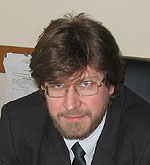© «Russia in Global
Affairs». №
1, January — March 2008
 Russia in Global Affairs is
Russia in Global Affairs is
celebrating a small anniversary: five years ago – in January 2003 –
the first regular issue of our journal appeared in print. Five
years is a short period of time in historical dimensions, but the
pace and substance of the current changes make one recall the
practice of calculating one’s length of service in the Soviet
Union. At that time, a year of work under harsh climatic conditions
or a year of performing a hazardous job was counted as
two.
Over these past
five years, global politics has taken several sharp turns and
Russia has changed markedly, as well. These years have seen many
events, which we witnessed and covered. These events were analyzed
by our most remarkable writers – policymakers, scholars and writers
from Russia and all major world countries. Judging by the interest
evoked by those publications, this journal’s approach has found an
appeal among our readers.
Relations between
Russia and the West in our rapidly changing world have always been
our focus. In this “anniversary” issue, we discuss this subject
again, especially as present developments give cause for this all
the time. In our very first issue, Vladimir Lukin wrote about the
need to abide by the European orientation and thus to confirm
Russia’s civilizational identity. Five years later, he follows up
on this subject. Philip Hanson draws the reader’s attention to some
practical aspects of Russian-EU cooperation in the energy sector.
He is confident that the mutual dependence of Russia and the
European Union leaves them no choice and the parties are “doomed to
cooperate.”
Boris Mezhuev
holds that Russia and the EU are divided not by some minor factors,
but because they belong to different types of cultural and
political consciousness. Therefore Russia and Europe must learn how
to live and cooperate without trying to understand each other. Igor
Zevelev raises the issue, which is actively discussed now, of
Moscow’s attitude toward Russian compatriots abroad and the
prospects of using the Russian diaspora in Russia’s own
interests.
Sir Roderic Lyne
is optimistic about the future. He believes that in a couple of
years the West will cease to view Moscow’s desire for an
independent position as something hostile, while Russia, having
overcome its period of self-assertion, will become a strong and
responsible partner. Anatoly Vishnevsky analyzes the global
demographic situation and concludes that without a serious
partnership with the West, Russia will find it very hard to keep
its independence in the face of Asian giants. Jean-Pierre Lehmann
draws a gloomy picture of the global economy. He is apprehensive
about the growth of protectionism, which can bring about conflicts
between traditional centers of economic influence and new ones –
Russia, China and India.
Ivan Safranchuk
focuses on the situation in Central Asia, which is generally
believed to be an arena of geopolitical rivalry between Russia, the
United States and China. Georgy Toloraya analyzes Russia’s policy
with regard to the Korean conflict – one of the most acute problems
in the Pacific region. General Victor Yesin urges Russia and the
U.S. to preserve the nuclear arms control regime, which may cease
to exist several years from now.
The handover of
power in Russia opens a new political cycle in this country. Dmitry
Furman tries to figure out whether there is any chance for
ideological pluralism amid political stability and the domination
of one political force. Leonid Grigoriev writes about the main task
Russia’s next president will face – namely, the large-scale
modernization of the country. This task is unfeasible without joint
active efforts by the state, business and civil society. Mikhail
Delyagin warns about the dangers that Russia’s economic and
geopolitical luck of the last few years may pose in the near
future.
Alla Yazkova
writes about Moscow’s ethnic policy, which has repeatedly caused
deep crises in Russia and the Soviet Union. Finally, in our
Controversy section, Russian diplomat Vladimir Kazimirov and
Azerbaijani political analyst Fuad Ahundov argue about the causes
behind the deadlock in the settlement of the Nagorno-Karabakh
conflict, the oldest ethnic conflict in the territory of the former
Soviet Union, which erupted during the last years of the Soviet
Union. The conflict is twenty years old this winter.
Our next issue
will mainly focus on one subject. In May 2008, Vladimir Putin will
officially step down as the president of Russia, and we will sum up
some of the results of his eight years in power.










